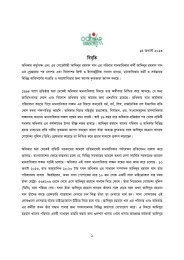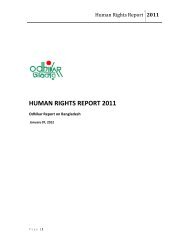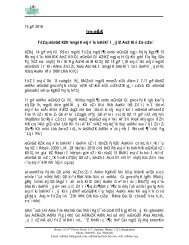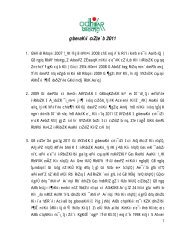Please - Odhikar
Please - Odhikar
Please - Odhikar
Create successful ePaper yourself
Turn your PDF publications into a flip-book with our unique Google optimized e-Paper software.
ecomes extremely difficult to get a witness and provide protection to him/her. The same is<br />
applicable if the State is the offender. The victim and witness are often pressurized and it<br />
becomes extremely difficult to provide appropriate evidence.<br />
The jurisprudence of compensation to victims of crime found expression in the 1960's in the<br />
West. In India, the jurisprudence of victim's rights is emerging very gradually, with<br />
compensation to the victim at the fore, breaking ground for the inclusion of various other rights<br />
like those required for reparation and restitution. The United Nations Commission on Prevention<br />
of Crime at the 7th U.N. Congress at Milan in 1985 adopted a Declaration of Basic Principles of<br />
Justice for Victims of Crime and Abuse of Power.<br />
In India, a victim has a marginal focus in the criminal justice system, in which arrest,<br />
prosecution and punishment are effectuated by the State. The police, therefore, investigate the<br />
offence alleged to have been committed and charge the accused on its own discretion without<br />
any participation from the victim. Pursuant to this, the accused is tried, and if proven guilty<br />
he/she is penalized by the Court. Even at this stage the victim is not given any opportunity for<br />
expression on matters related to bail, quantum of sentence, and appeal against inadequacy of<br />
sentence or of acquittal. There is a need therefore, to increase the level of participation of the<br />
victim in the criminal justice system not only for the well being of the victim but also to achieve<br />
the larger goal of criminal justice.<br />
The provisions in the Code of Criminal Procedure, minimal in scope but relevant for a<br />
victim are as follows:<br />
Section 357 Makes provision for the compensation of the victim for the loss or injury suffered<br />
by him/her.<br />
Section 301(2) States that a private person may appoint his/her own pleader to prosecute any<br />
person in any court, but the pleader can act only under the directions of the State Public<br />
Prosecutor or Assistant Public Prosecutor. The pleader can submit written arguments with the<br />
permission of the Court after the evidence is closed in the case. This provision needs to be<br />
amended to provide the victim the right to appoint his/her own pleader who may function<br />
independently as prosecutor.<br />
Section 377: Provides the right to appeal against the inadequacy of sentence to the State and the<br />
complainant has no say in the matter.<br />
Section 378: Gives the complainant the right to appeal if the case was instituted upon complaint<br />
and special leave by the High Court is obtained. This provision has not been made for<br />
proceedings initiated on a police report.<br />
Section 401(1): Provides that the complainant may invoke revisional jurisdiction to the High<br />
Court or Court of Session.<br />
Section 235(2) & 248(2): Provides the accused on conviction, with the opportunity to be heard<br />
on the question of sentence, before passing a sentence on him according to law. The victim does<br />
not have right to be heard on the question of sentence to be passed on the accused.<br />
It is clear from the above provisions, that the victim has an inadequate degree of participation in<br />
the criminal justice system.<br />
172<br />
Report 2005











